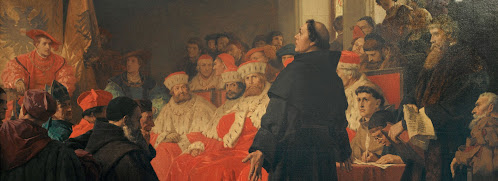The Defiant Stand of Martin Luther: A Turning Point at the Diet of Worms
In the annals of religious history, few events resonate with the seismic impact of the Diet of Worms in 1521. This assembly, convoked in the quaint German town of Worms, became the epicenter of a theological earthquake that would forever reshape the landscape of Christianity. At its heart was a defiant monk named Martin Luther, whose audacious challenge to the might of the Catholic Church and the Holy Roman Empire would ignite the flames of the Protestant Reformation.
The story of the Diet of Worms is inextricably linked to the complex tapestry of early 16th-century Europe, a time when the Catholic Church's influence permeated every facet of life. Amidst this religious monopoly, Martin Luther, a German monk and theologian, emerged as an unlikely protagonist. His journey to Worms began with 95 Theses, nailed to the door of the Castle Church in Wittenberg in 1517. This act, initially an academic objection to the Church's sale of indulgences, spiraled into a foundational critique of the Church's teachings and practices.
Luther's primary contention lay with indulgences - payments made to the Church to reduce punishment for sins. He viewed this as corrupting the Christian doctrine of salvation through faith, not financial transactions. His theses, spreading like wildfire through the newly invented printing press, questioned the Pope's and the Church's infallibility, challenging centuries of established authority.
The response from the Vatican was swift and stern. Pope Leo X, viewing Luther's teachings as a direct challenge to papal authority and Church doctrine, excommunicated him in 1521. This escalation set the stage for the Diet of Worms, convened by Emperor Charles V, a staunch defender of Catholic orthodoxy. The Diet was a general assembly of the estates of the Holy Roman Empire, a gathering of princes, bishops, and other dignitaries to deliberate on imperial matters, including the troublesome issue of Martin Luther.
As Luther made his way to Worms, he was acutely aware of the gravity of his situation. His journey had the air of a solemn procession, a march towards a destiny that would define his legacy and that of the Christian faith. Upon his arrival, he was presented with a simple yet profound question: Would he recant his writings against the Church?
Luther's response echoed through the halls of history: "Here I stand; I can do no other." This statement, a blend of defiance and conviction, marked a pivotal moment in the Reformation. It was a refusal to yield to the towering structures of ecclesiastical and political power, a stand for what he believed to be the truth of the Scriptures.
The Diet of Worms concluded with the Edict, declaring Luther an outlaw and heretic. This edict meant that anyone could kill Luther without legal consequence, a testament to the peril he faced. Yet, his ideas could not be so quickly extinguished. The seeds of Reformation, sown by his stand in Worms, sprouted across Europe, challenging the Catholic Church's monopoly on spiritual authority and giving birth to various Protestant denominations.
In retrospect, the Diet of Worms was more than a confrontation between a monk and an empire; it was a battle of ideologies. It represented a clash between the medieval worldview, anchored in the absolute authority of the Church, and the emerging modern mindset, advocating for religious freedom and personal interpretation of the Scriptures. Luther's defiance at Worms didn't just challenge the Church; it questioned the foundations of spiritual and political power, paving the way for a new era of religious thought and practice.
Today, the echoes of Luther's stand at the Diet of Worms continue to reverberate, a testament to the enduring power of conviction in the face of seemingly insurmountable opposition.



Comments
Post a Comment